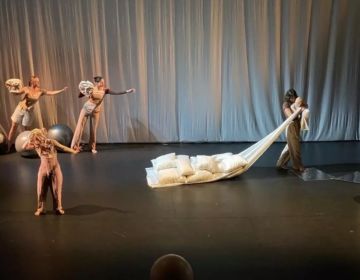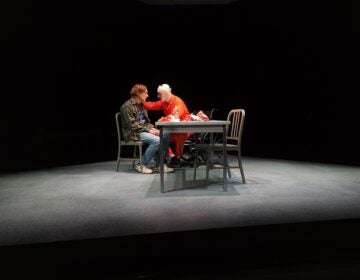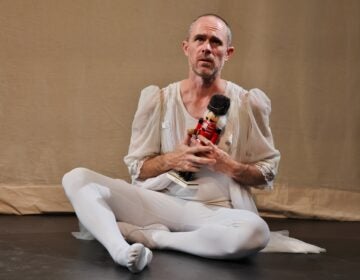This Philly Fringe ‘Othello’ is reimagined for the Israeli-Palestinian conflict
Palestinian writer-director Zaina Yasmin Dana hired her brother to play the title character, informed by their upbringing in the West Bank.
Listen 3:20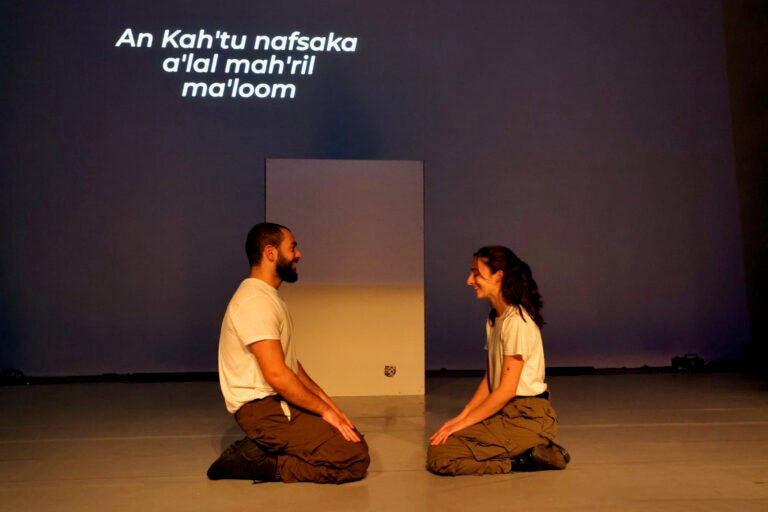
Othello (Qais Dana) marries Desdemona (Maddie Gillespie) in a retelling of Shakespeare's tragedy that casts all the characters as soldiers in the Israeli army. (Emma Lee/WHYY)
From Philly and the Pa. suburbs to South Jersey and Delaware, what would you like WHYY News to cover? Let us know!
This reporting is funded by HFGF.
Zaina Yasmin Dana, a Palestinian theater artist living and working in Philadelphia, has been keenly watching pro-Palestinian street action protesting the Israeli invasion of Gaza and wondering why none of that energy has appeared on Philadelphia stages.
Unlike the Russian invasion of Ukraine in 2022, which prompted quick responses by theater artists, particularly at the Wilma Theatre, the war in Gaza did not seem to generate a similar reaction.
“We can’t just ignore that people for the past year have been seeing this all over the news,” said Dana. “We know it, and for some reason, we don’t want to talk about it on stage.”
Dana is now talking about it on stage. “Othello (vs. the Military Industrial Complex),” opening this weekend at the Icebox as part of the Fringe Festival, is her adaptation of Shakespeare’s classic.
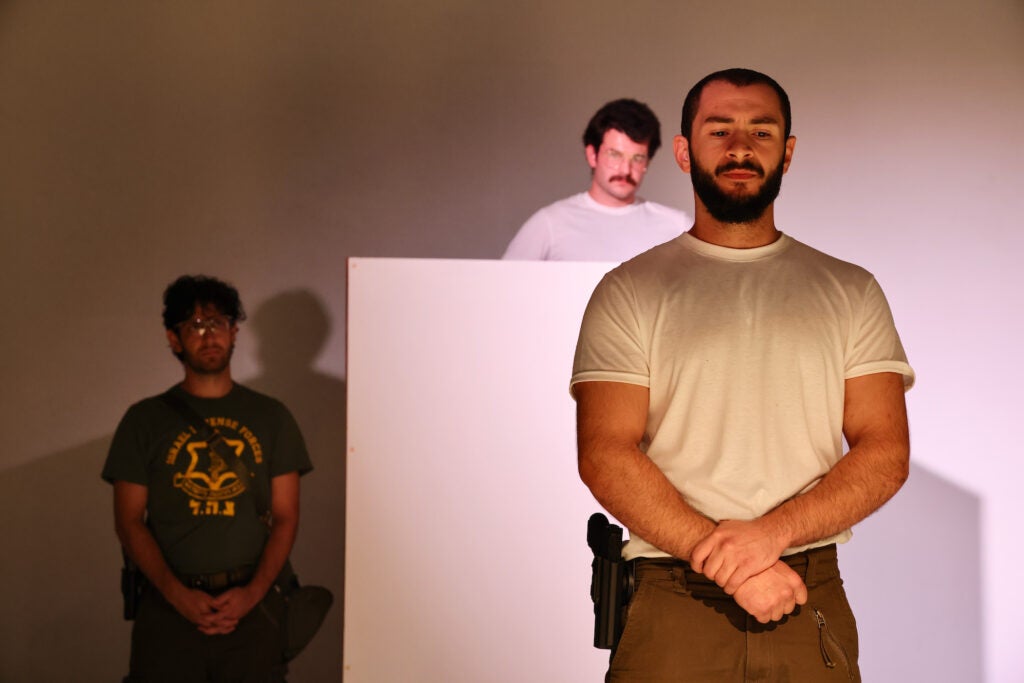
She reimagines the tragic figure — a Black Moor leading the Venetian army who is tricked into killing his Italian wife — as a Palestinian man who joins the Israeli army, rises to the rank of general, then manipulated into killing his American-Israeli wife.
More than an interesting thought experiment, Dana says “Othello” is a necessary vessel for processing the last year.
“I can’t even begin to comprehend thinking about the immense amount of violence that we’re seeing. I mean, everyone on their phones for the past year has been seeing on Instagram the most graphic, violent images coming out of Gaza,” she said. “We haven’t had a way in Philadelphia theater to come together and begin to process what we’re seeing.”
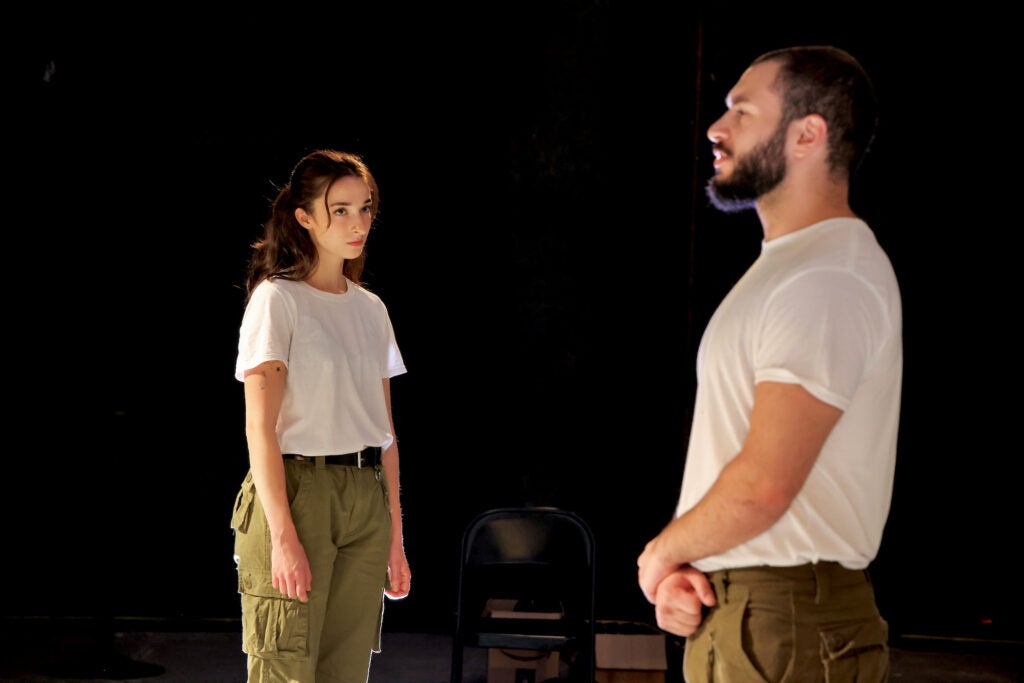
The world of “Othello” Dana created onstage is a deeply militarized one. The title character is surrounded by young Israeli Defense Force (IDF) soldiers, some of whom recite lines taken verbatim from interviews Dana conducted with real Israeli soldiers. The character Desdemona returns to Israel from studying in the United States and seeks employment in the IDF.
The play revolves around IDF soldiers dancing at techno clubs and raves. The parties serve the plot: The highly stimulating nightclub environments, sometimes drug-fueled and hyper-sexualized, allow Othello’s nemesis Iago to seed falsehoods in his mind, leading to his tragic conclusion.
Dana hired the Palestinian-American composer Fouad Dakwar to compose a rave soundtrack incorporating samples of Arabic music.
“We use a backdrop of EDM rave parties to create this group of soldiers that are really young — 18 through 20 — trying to figure out who they are, their relationship to their country, their relationship to serving in the face of a lot of violence in Gaza,” Dana said. “One of the things that we’re really focused on was creating this sense of dissonance.”

Iago, played by Jackson Purdy, addresses the audience to explain that upon discharge from the IDF, about 20,000 former soldiers typically travel to India as a post-military excursion, 90% of whom engage in intense recreational drug use leading to thousands with mental health problems, according to the 2007 documentary film “Flipping Out.”
“It’s not just good military strategy, it’s the best strategy to imbibe, to invite pop stars and American celebrities to rally the troops, all to forget about the stress of pushing the button,” Iago explains onstage. “That building on your monitor that you just bombed might look like a residential building if you’re sober.”
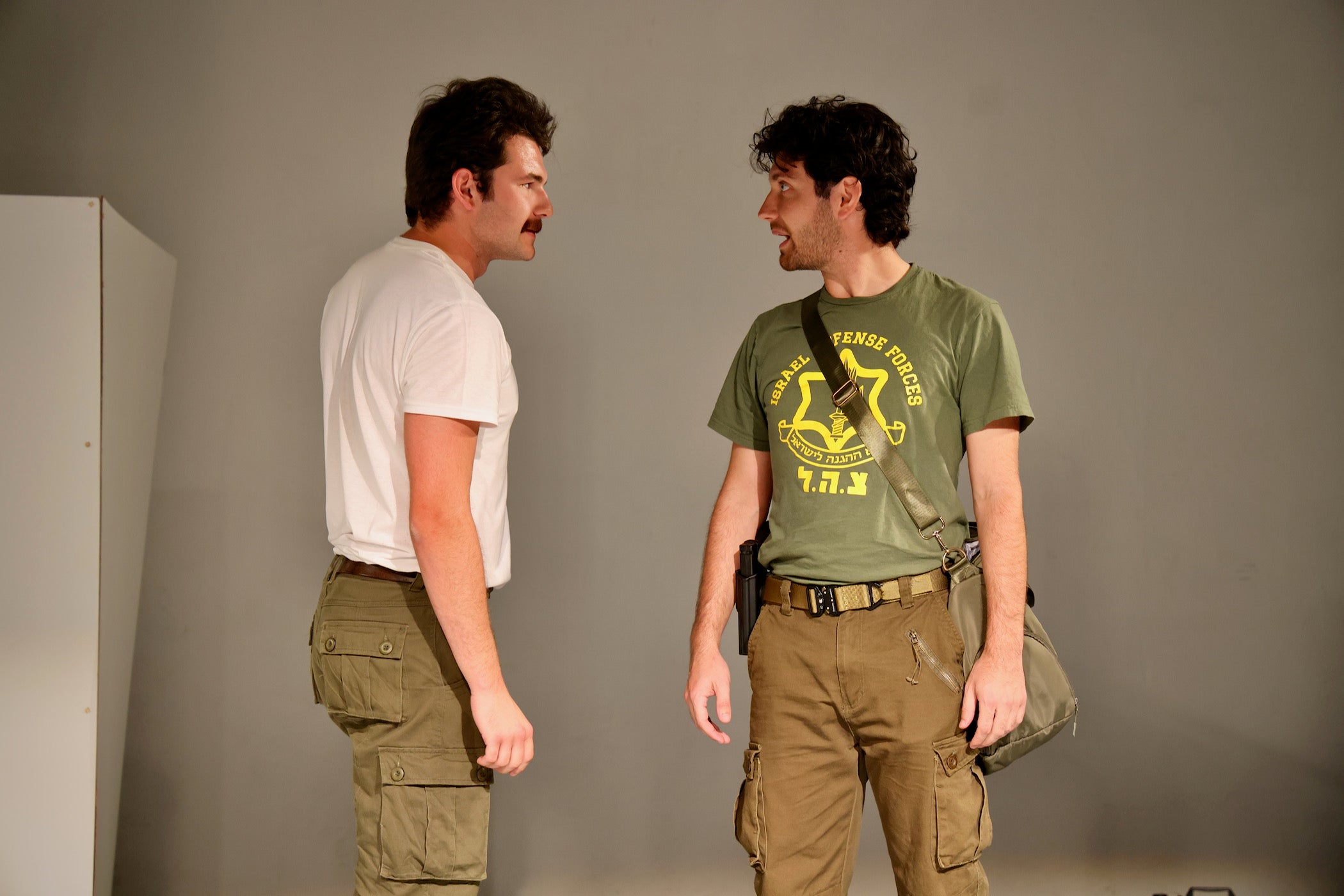
Dana’s Othello is a flawed and deeply conflicted character; having turned against Palestinians after witnessing his father attack his mother, he commits himself to the Israeli military. There, he finds great professional success but, as a Palestinian, is never able to assimilate fully.
Playing the title role of Othello is Dana’s younger brother, Qais Dana, who has no previous acting experience. She said he is the best choice for the role because this story is personal.
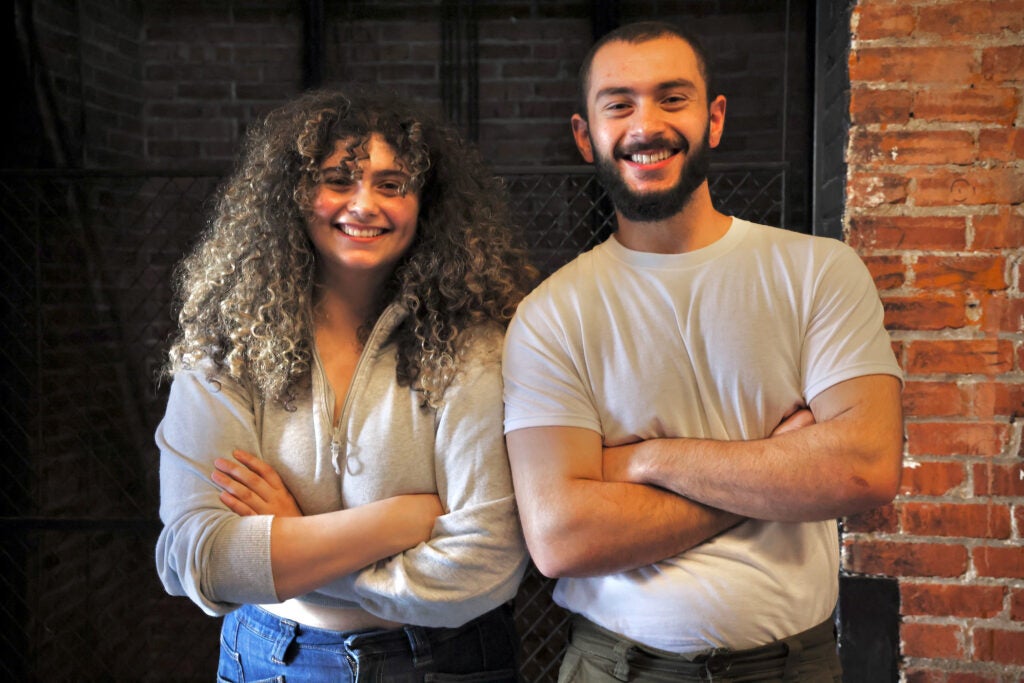
The Danas grew up in Hebron in the West Bank. Before they were born their father, as a 16-year-old boy in West Bank in the 1980s, was kidnapped by Israeli soldiers and subjected to torture in an attempt to force false confessions. Zaina said that, as an adult, her father still bears scars on his legs from electrocutions.
Qais remembered at 14 years old, almost the same age as his father when he was abducted, his father presented him with the sworn affidavit that details his abduction and abuse.
“He always made sure that we understood that we didn’t run, we didn’t flee anything,” he said. “We are proud of who we are, and that what he endured was not for nothing.”
Zaina insisted that the title character of “Othello” be played by a Palestinian, but it was a challenge to secure an available actor. Someone suggested her brother, despite having never acted before. Both brother and sister balked at the idea until it started to make sense.
“I feel like, having experienced our father’s post-traumatic stress disorder, we would best do it together,” Qais said. “Her directive mind and me living vicariously through this experience of what could have been me. If we had stayed, if things had escalated in a way that my father maybe committed violence to my mother, I could have been Othello.”
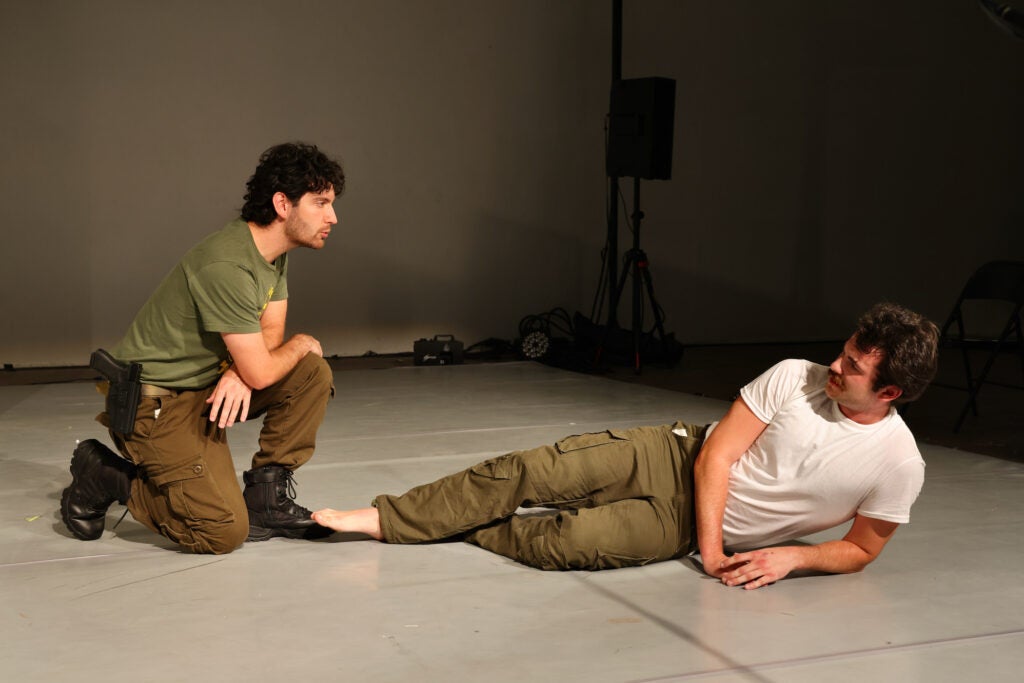
Outside of a theater, the Israeli-Palestinian conflict is usually pitched in absolute dichotomous terms, serving the needs of the protest. Zaina said theater enables her to build nuanced, conflicted, and flawed characters that might get closer to a certain truth.
“We should be allowed to explore the ugly side of trauma and what it does to young men who experience extreme violence, without calling for our elimination,” she said. “We deserve a space to be complicated safely, without justifying the complete destruction of our homes and our infrastructure and our universities and hospitals. That’s why these stories matter a lot.”
“Othello (vs. the Military Industrial Complex)” runs Sept. 20–26 in the Icebox Project Space, at the Crane Arts Building. It is supported by the Al-Bustan Award for SWANA Artists and co-presented by the Cannonball Festival.

Saturdays just got more interesting.
WHYY is your source for fact-based, in-depth journalism and information. As a nonprofit organization, we rely on financial support from readers like you. Please give today.


